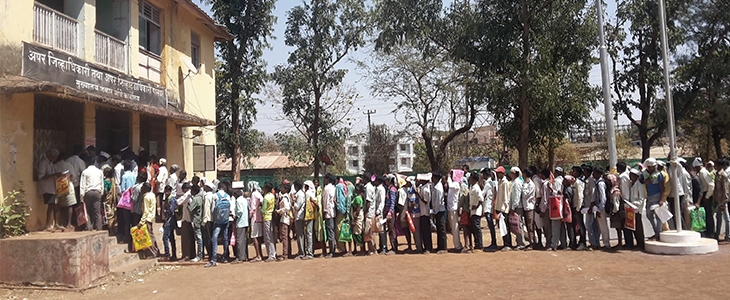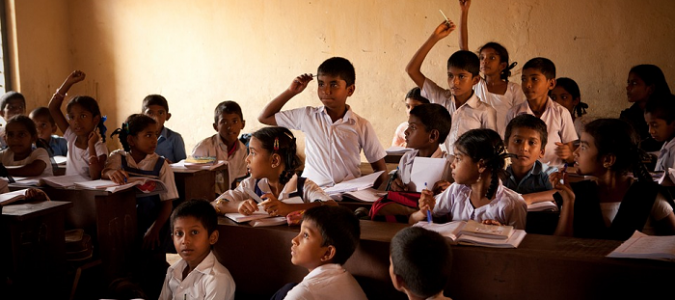
Right to Whose Education?
15 June 2017
This is the fifth part of an eight-part series on the challenges and life hacks in experiencing and accessing government benefits and services.
Sunil* hesitated when asked to take a seat next to me, constantly turning to look at his employer for support. His employer was speaking on his behalf in the beginning but as he started remembering the details of his story, the shyness melted away. I found out that behind the shy smile was a father determined to get his 4-year-old daughter admitted to a school where quality education is imparted.
Sunil hails from Jharkhand and has been employed with this South Delhi-based family since the past 17 years. He lives close by with his wife and two daughters aged 4 and 2. An illiterate man himself, he first heard of the Economically Weaker Section/Disadvantaged Group quota (EWS/DG quota) under the Right to Education Act (RTE Act) through his employer. The RTE Act mandates private unaided schools to reserve 25% seats in entry-level classes for students belonging to weaker sections. In Sunil’s case, his employers were and continue to be the primary catalyst in helping him achieve his dream.
It takes a village
To begin with, his employers informed him of the EWS/DG quota and encouraged him to apply. They took the lead on understanding the process – which websites to look at, admission dates, and the documents which would be needed for the admission. With their help, Sunil started preparing for the admission run six months before the admission cycle started. Sunil had to first get an Income Certificate made, something he had never done before, so it took him some time to figure out the process and multiple visits to the relevant office.
He was turned away for various reasons and after repeated attempts to get a certificate made, he had to go through an agent who charged him a high fee to get the job done.
Sunil also reached out to his relative whose child is admitted to the school of his choice through the EWS/DG quota to understand the peculiarities of the school. When the admission portal opened, his employers filled out the form for him since he is not computer literate and the admission form is largely in English.
When he got a call back from the school for document verification, he was asked to furnish his daughter’s Birth Certificate. He thought the other documents would suffice which included his daughter’s Aadhaar card. The official guidelines issued by the Delhi government states, “a written declaration/undertaking from parents about the date of birth is treated as a valid proof of date of birth of the child,” but the school insisted on the original Birth Certificate.
So began Sunil’s ordeal of travelling back to Jharkhand (where his daughter was born) and running pillar to post to get the certificate made. The panchayat offices back in his hometown are riddled with infrastructural issues – internet crashes, frequent power outages, limited capacity of workers.
When Sunil tried to visit the school to explain the situation and give the proof of application, he was turned away at the gate itself. In the meanwhile, the employers got in touch with people close to the Education Department to gain clarifications. They were advised to lodge a formal complaint against the school on the Department portal. They did the same, quoting all the relevant rules, and also wrote an impassioned letter about the challenges that first generation learners have to face. The Department replied promptly although it was a single sentence response – that the school had been directed to comply “as per rules”!
Sunil attempted to visit the school again with the Department’s response and the proof of his daughter’s Birth Certificate application because the office back in Jharkhand was taking longer than anticipated. He was turned away again. Assorted members of the employer’s family then accompanied him on later dates to get past the security guard. This time they were able to handover the file to the receptionist. Shortly after, they got a call from the school stating that his daughter had been given provisional admission on the condition that the Birth Certificate be furnished by July 1 2017.
This ordeal has been going on since March, and he’s yet to get his hands on that certificate even though he’s made multiple visits to his hometown aside from the constant telephonic follow up.
Long way to go

On their part, the Delhi Government has taken several positive steps to ensure EWS admissions take place smoothly – the entire process has been made online to ensure transparency and the grievance redressal portal is active. Last year, the Government spent a considerable sum advertising the dates and process of admission through radio jingles and newspapers. Local booths were also set up which were manned by volunteers who helped parents fill up these forms. A video has been uploaded on the EWS Admissions page which shows how to fill up the form step by step and the instructions are in Hindi.
Sunil’s experience, however, shows that there are many obstacles a poor person has to face even when they have several factors working to their advantage. In his case, the biggest reason why he was able to reach this point was because his employers helped him along the way, including overcoming obvious class biases in trying to gain entry into the school itself.
The challenges don’t just stop there. As Sunil continues to wait for the elusive Birth Certificate, anxious about the status of his daughter’s admission and her future, perhaps the biggest challenge he now faces is to keep himself from giving up.
*Name has been changed to protect identity.





